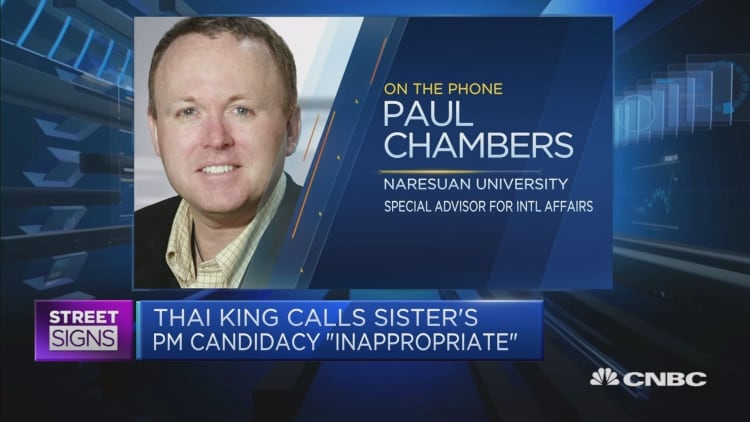In its largest single-day decline since last October, the Thai baht fell about 1 percent in Friday trade, following the Thai King's bid to thwart his sister's nomination as a prime ministerial candidate in the country's long-awaited elections.
That movement came after the surprise nomination of Princess Ubolratana Rajakanya, 67, as a prime ministerial candidate for the elections in March. While that move shocked observers, King Maha Vajiralongkorn then made headlines by issuing a statement saying it was "inappropriate" for members of the royal family to enter politics.
Prakash Sakpal, Asia economist at Dutch bank ING, called Friday's sharp depreciation "a glimpse of how a spike in political risk in the run up to (the) election on 24 March is likely to weigh on markets." The baht, which was one of Asia's best performing currencies last year, could continue to weaken, he said.
On Friday, the currency fell to a low of 31.64 against the dollar, according to Reuters. That was the largest single-day decline since Oct. 22 last year, when it fell 0.7 percent, according to Sakpal. On Monday morning, however, it had bounced back slightly to 31.48 against the dollar.
Still, the baht remained much stronger than it had been only months ago: The currency traded at about 33 to the dollar at the beginning of December.
Thai markets, for their part, fell on Monday in early trade, slipping as much as 0.7 percent.
Ubolratana's nomination last week was a shocking move from the Thai Raksa Chart party, which is made up of supporters of former Prime Minister Thaksin Shinawatra, and broke with a longstanding tradition of members of the royal family staying out of electoral politics.

The election set for March 24 would be the first since a military coup in 2014.
Sakpal said the events on Friday have "really stunned the public," and could escalate as the Thai Raksa Chart party faces a possible dissolution — the country's Election Commission is considering a complaint seeking to ban the party.
"Given the history of Thai politics, things taking an ugly turn cannot be ruled out," the economist said.
He said that the baht could drop to 32 against the dollar, in the run-up to the elections.
Political risks, Sakpal said, will "continue to exert a weakening pressure on the currency as the global investors, who have been hitherto pouring funds into Thai assets, will likely start treading a cautious path until after the political dust settles."
— Reuters contributed to this report.


